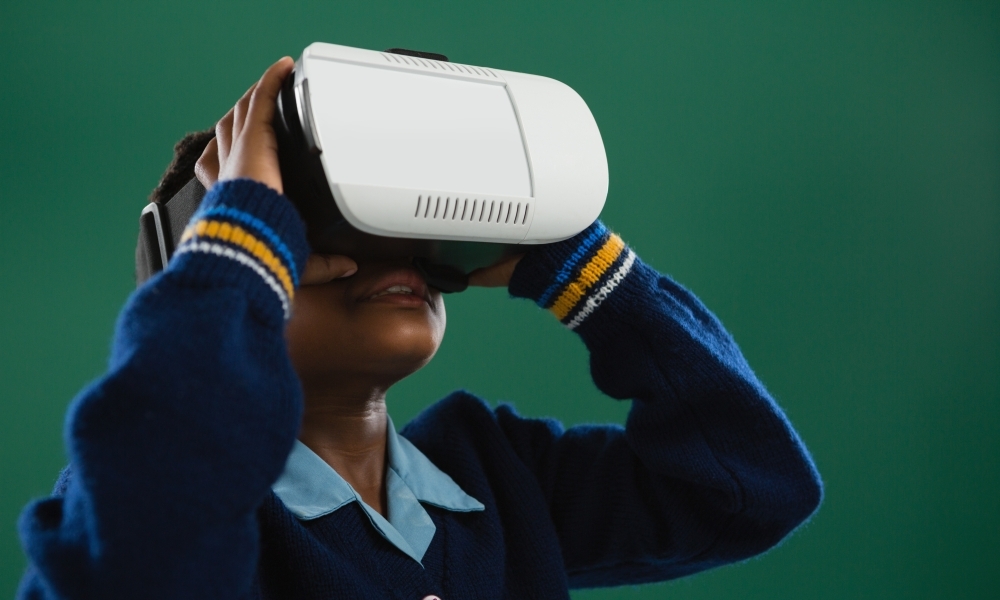The use of immersive virtual reality (IVR) in the classroom can present an exciting learning opportunity for students. While it’s engaging for many students, is it an effective tool for improving their knowledge?
Research involving almost 300 secondary school students has shown that while the use of IVR can increase student enjoyment and engagement in the learning task, when used on its own it may not be the most effective tool for improving outcomes like declarative and procedural knowledge.
The study’s findings are shared in a paper published in the Journal of Educational Psychology, authored by Guido Makransky, Niels K Andreasen and Sarune Baceviciute from the University of Copenhagen and Richard E Mayer, from the University of California, Santa Barbara.
‘We conducted the study because there was existing evidence that IVR simulations lead to better learning outcomes specifically when students have the opportunity to reflect over the content,’ lead author Guido Makransky, tells Teacher.
The impact of virtual reality and video use in the classroom
The study was comprised of two experiments that were conducted with the participating students. In the first experiment, 131 students were involved. They were randomly allocated to one of two groups: the first group used VR headsets to experience a science simulation that involved forensic analysis of a collected DNA sample in a virtual laboratory environment, and the second group instead watched a video presenting the same forensic analysis procedure.
‘Immediately after the learning experience, students in both groups were given the post-test …The post-test included scales to investigate students’ self-reported perceived enjoyment and presence, as well as tests of declarative and procedural knowledge,’ the journal paper reads.
‘The declarative knowledge test included 19 multiple-choice questions and included conceptual and factual knowledge questions related to the information presented in the simulation or video … The procedural knowledge test included three open-ended questions (e.g., “Describe in steps how to use a pipette to prepare laboratory samples. Mention as many steps as possible.”)’.
The results of this post-test show that students who participated in the IVR activity reported higher levels of enjoyment than those who watched the video. However, participation in the IVR activity did not increase their knowledge of the forensic analysis procedure.
Using virtual reality in conjunction with other learning activities
The second experiment, involving 156 students, was conducted to investigate the impact of IVR on student outcomes when used in conjunction with what the researchers call a generative learning activity. In this case, the generative learning activity was an enactment activity, which involved using physical props to re-create the laboratory analysis the students just learned about.
‘The main purpose of adding a generative learning strategy to a lesson is to stimulate learners to reflect and integrate prior knowledge with the learning material, thereby helping the learner to construct a more meaningful mental representation of the material,’ they write. ‘This is particularly relevant for IVR, as these lessons can be highly engaging but can cognitively overload learners, thereby limiting their ability to properly reflect and self-regulate during a lesson.’
Students were randomly allocated to one of four groups for this experiment: use of IVR; use of IVR and participation in an enactment opportunity; watching a video; and watching a video before participating in an enactment opportunity.
After participating in the learning activity, students completed a post-test similar to the one used in the first experiment. The results of this post-test showed that, similar to experiment one, student self-perceived enjoyment of and presence in the activity was higher for students who used IVR.
While the inclusion of the enactment activity did not seem to improve declarative knowledge, it was found that participation in the enactment activity had a greater effect on procedural knowledge when learning in IVR than by video.
‘This is a major new finding in this experiment, and indicates that enactment can improve procedural knowledge, only when learning through IVR,’ the paper reads.
Improving learning outcomes using virtual reality
‘IVR can provide students with a very emotionally rich and engaging learning experience. This almost always increases student interest and enjoyment, but it does not necessarily lead to better learning outcomes unless students have the opportunity to reflect over the emotionally rich and engaging experience,’ Makransky tells Teacher.
‘The overall implications are that teachers should provide students with initial learning experiences and enough prior knowledge so students have fundamental knowledge and have enough familiarity with the technology prior to an IVR lesson,’ he explains.
‘Then use IVR for exploration opportunities where students can obtain learning experiences that are too expensive, dangerous, or impossible in the real world. Then follow this up with a reflection activity. This does not necessarily have to be enactment. We have successfully used different generative strategies after an IVR lesson such as summarisation in groups (Klingenberg et al., 2020).’
References and further reading
Klingenberg, S., Jørgensen, M. L. M., Dandanell, G., Skriver, K., Mottelson, A., Makransky G. (2020). Investigating the Effect of Teaching as a General Learning Strategy when Learning through Desktop and Immersive VR: A Media and Methods Experiment. British Journal of Educational Technology, 51(6), 2115-2138. https://doi.org/10.1111/bjet.13029
Makransky, G., Andreasen, N. K., Baceviciute, S., & Mayer, R. E. (2021). Immersive virtual reality increases liking but not learning with a science simulation and generative learning strategies promote learning in immersive virtual reality. Journal of Educational Psychology, 113(4), 719–735. https://doi.org/10.1037/edu0000473
https://www.virtuallearninglab.net/ shares more of Guido Makransky’s work on this topic.
If you have you used virtual reality with your students, did you measure the impact this tool had on their learning? What considerations did you make to ensure the tool was used most effectively to improve student outcomes? Did you provide initial learning experiences to build their prior knowledge before moving to virtual reality?
